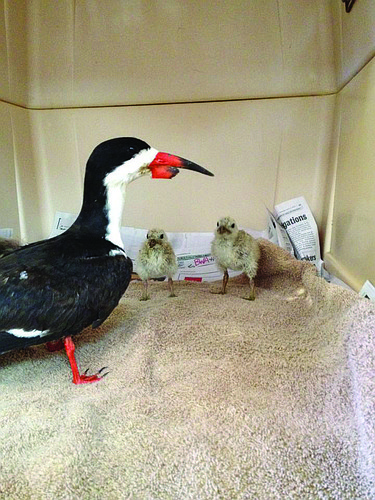- April 19, 2024
-
-
Loading

Loading

A Longboat Key beachgoer wanted to see two newly hatched black skimmers, but the mother wouldn’t allow it.
She did what came naturally to a mama bird and wouldn’t allow the woman to come closer.
According to reports, the woman responded by throwing a beach chair at the mother, breaking off her beak.
Sarasota Audubon rescued the mother and two babies in late June and brought them to Save Our Seabirds. The mother was in critical condition and couldn’t feed her babies, so SOS staffers devised a unique feeding device. They formed a puppet out of an old black scuba glove and wrapped white-and-orange tape around the fingers so that it would look like the beak of a black skimmer.
“Now, those babies are growing fast,” said David Pilston, CEO of SOS, who shared the story Thursday, July 11, at the Kiwanis Club of Longboat Key meeting.
He estimates the babies are five times the size they were when they arrived at the facility. They could be released into the wild within a month.
As for the mother, she’s eating and getting healthier after arriving at SOS in critical condition. Staffers and volunteers have tube-fed her and gotten her to eat small shrimp. Although plans for her aren’t finalized, a dentist might build a prosthetic beak for her.
With a prosthetic beak, returning to the wild could be a possibility for her, although it’s more likely that she’ll become a permanent bird resident at SOS.
In the meantime, the mama bird and her babies have received plenty of good wishes on the SOS Facebook page at facebook.com/SaveOurSeabirds, which tells the stories of many of the organization’s patients and residents.
It’s hard out there for a chick
Black skimmers hatch on the open beach, meaning they face multiple hazards — wind, rain, flooding from high tides and surf and tropical storms, according to retired veterinarian and wildlife photographer Dr. Lou Newman.
They also face their share of sibling rivalry, because they compete for fish caught by their returning parents, meaning that the strongest chick often eats first.
As if that weren’t enough for a chick, they also face predators, including raccoons, cats, ghost crabs, crows and gulls — the latter of which have been known to swoop in and grab chicks as they rush to be fed; fish crows sometimes keep an eye on black skimmer colonies and steal eggs or straying chicks.
The hard life is enough to make Newman conclude: “When I return for a second life, of one thing I am sure, I don’t want to be a black skimmer chick!” he wrote to those who subscribe to his photography emails.
Contact Robin Hartill at [email protected].